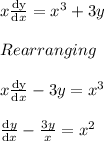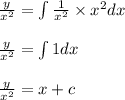Answer:
General Solution is
 and the particular solution is
and the particular solution is

Explanation:

This is a linear diffrential equation of type
 ..................(i)
..................(i)
here


The solution of equation i is given by

we have
![e^(\int p(x)dx)=e^{\int (-2)/(x)dx}\\\\e^{\int (-2)/(x)dx}=e^(-2ln(x))\\\\=e^{ln(x^(-2))}\\\\=(1)/(x^(2) ) \\\\\because e^(ln(f(x)))=f(x)]\\\\Thus\\\\e^(\int p(x)dx)=(1)/(x^(2))](https://img.qammunity.org/2020/formulas/mathematics/college/6xo1qzyuk6ievkdjaj8kmpb42x209c9p4t.png)
Thus the solution becomes


This is the general solution now to find the particular solution we put value of x=2 for which y=6
we have

Thus solving for c we get c = -1/2
Thus particular solution becomes
